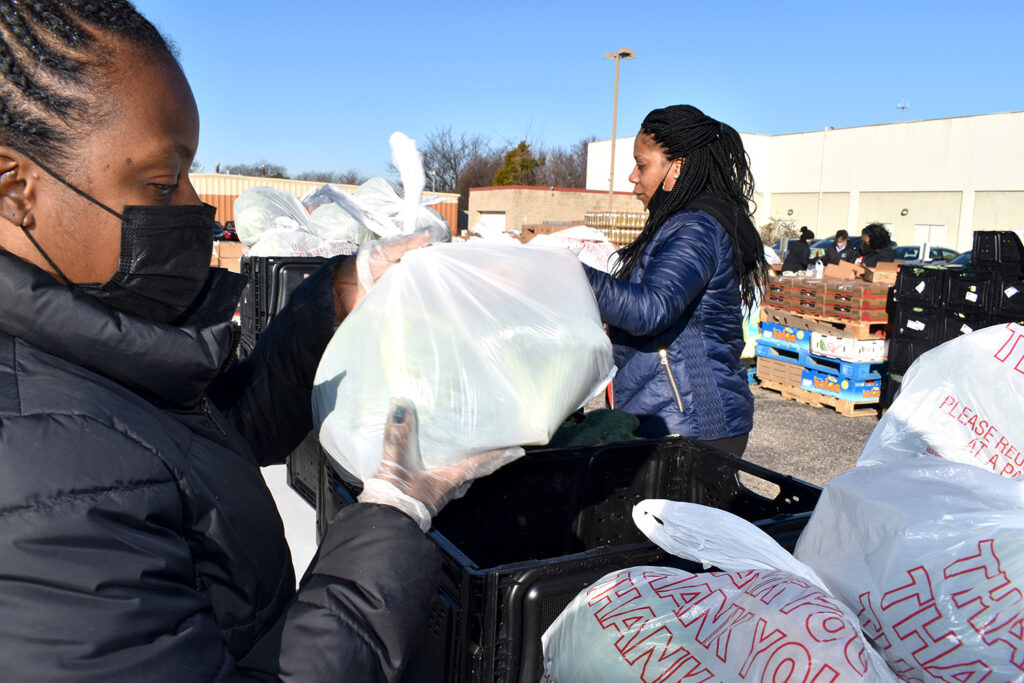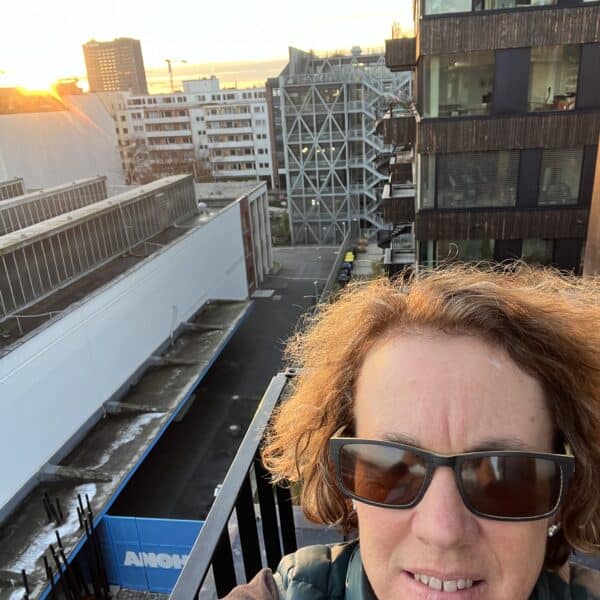Many Bible stories, including Jesus twice feeding the thousands, lend a spiritual reference to any story about feeding the hungry. Instead of sending them back to their villages to eat, Jesus said, “Bring them here to me,” and fed them with fish and bread that miraculously multiplied. Here in the Mid-South, the Mid- South Food Bank (MSFB) accomplished something nearly as miraculous during the pandemic by increasing their food distribution from 1.6 million pounds a month before the pandemic to 5.5 million pounds a month at the pandemic’s height. Currently MSFB is giving out 3.5 million pounds of food to those in 31 Mid-South counties, with half going to Shelby County and a third to Memphis.
Cathy Pope, MSFB president and CEO, had only been on staff for six months when the pandemic hit, but she and her chief operating officer Peter Pettit drew on their experience in Gulf Coast disaster relief to quickly assess the vastly increasing need. Pope says, “Right when we saw it happening we leased all the box trucks that we could, hired more drivers and more warehouse workers, put food orders in the queue before we knew what was happening. That really jump-started us. That’s how we made it happen.”
Pope remembers like yesterday March 12, 2020, the day that Shelby County schools closed. She and Pettit conferenced with Shelby County schools, immediately looked at areas of most need, and started mobile distributions in those neighborhoods. “There were so many people in need so quickly, the lines got so long, that our [partner] agencies very quickly got overwhelmed. They’re used to feeding 100 families and 400 were at their door. That’s where we really ramped up our mobile distributions.”
Prior to the pandemic, MSFB distributed food primarily through their network of 300 brick and mortar food pantries, 80% of which are housed by faith-based organizations, and staffed by volunteers from those organizations, including many churches from a variety of denominations. With extra trucks and person power during the pandemic, MSFB was able to establish many mobile pantries that were better positioned to serve more people. “We took our mobiles from about 60 a month to about 220. That became our work force to get the food out.” Those mobile pantries enabled MSFB trucks and volunteers to quickly set up, unload food, prepare boxes, and facilitate cars to drive through, complete paperwork, and receive food boxes, alleviating the need for storage space.
Many new distribution spots were local churches and various Shelby County schools, who then assisted with volunteers to staff distribution. MSFB advertised the times and locations of these mobile distributions on their website, social media, radio, and in their newsletter. Since the beginning of the pandemic MSFB has added 62 partners, the majority of them faith-based organizations whose volunteers help to pack and distribute food. Volunteers tell Pope that working at a mobile pantry is an eye-opening experience. Many realized that they could easily be the ones in need; seeing families come through the line and being so thankful was a blessing.

Pope says that the need to feed the hungry in the Mid-South was great prior to the pandemic, and she does not see it diminishing in the next six months to a year. According to the latest report from Feeding America, Memphis has the highest rate in the United States of food insecurity for seniors with 15.6% of seniors in the Memphis area food insecure, meaning they are skipping meals, not eating enough, or not sure when they’ll eat again. She feels that the pandemic has highlighted hunger in our communities and that this is the work she is called to do. “I think our work at the food bank is so important to families trying to figure out how to make ends meet and if we can take the worry of feeding children and families off the table, so to speak, we have served the least of these and honored God in the process.” The pandemic in general she thinks has softened people’s hearts to the problem of hunger, which will help solve this problem in our community.
The giving spirit through both donations and volunteering is evident at the Mid-South Food Bank, which originally grew out of the Metropolitan Inter-Faith Association (MIFA) in 1981. Pope says that MSFB has a huge donation base and, especially during the pandemic crisis, people called and gave because they saw the long lines. “We have a lot of individual donors that have donated a one-time amount of $50,000 or $2, and many who give $10 a month, the whole gambit. If you put it all together it really makes a significant difference in the community.” She says that the best way people can help the food bank is to donate. They can stretch $1 into three meals and really make a difference with individual donations.
While the Mid-South Food Bank is the area’s premiere nonprofit working to end hunger, the need is great and many other churches and groups around Memphis and Shelby County work to ease hunger through their food ministries as well. Grace-St. Luke’s (GSL) Episcopal Church is one of these organizations with both a food pantry and an outreach program known as More Than a Meal (MTAM). Begun in 2001, MTAM offers food, companionship, and prayer to the hungry. Eight different churches, including St. Luke’s Lutheran and Annunciation Greek Orthodox, rotate responsibility for cooking and serving meals every Sunday afternoon. Prior to the pandemic this outreach ministry fed approximately 100 guests each Sunday with a home-cooked meal, including enough for seconds. Beginning in April 2020 cooking teams prepped approximately 70 to-go boxes for guests to pick up. Finally in January 2021, guests returned in person to Trezevant Hall at GSL.

Photo by Tricia Dewey
Barb Boucher, a MTAM team leader from Church of the Holy Communion, likes to plan meals as if she was serving guests in her home, sometimes celebrating holidays of the month like Cinco de Mayo. She has always had a love for cooking, thinks of it as her gift from God, and has prayed about where to use it. She says the pandemic has kept her very busy putting her gifts to use with programs like More Than a Meal. While the numbers of guests are lower than they have seen in the past, MTAM teams hope that more guests will gradually make their return.
GSL Pastor Ollie Rencher says that Grace-St. Luke’s outreach ministries, such as More Than A Meal and the food pantry, provide spiritual growth opportunities for persons to learn what it means to serve Jesus Christ. As Jesus said, “for I was hungry and you gave me food, I was thirsty and you gave me something to drink… Truly I tell you, whatever you did for one of the least of these brothers and sisters of mine, you did for me.” And so Rencher explains that the spirituality of volunteers serving those who experience hunger, economic hardship, and a lack of permanent housing, is rooted in scripture, faith, and a commitment to strive together in the work of building “beloved community.” In Memphis and Shelby County, both the secular and faith communities join together in this spiritual feeding of the hungry.




